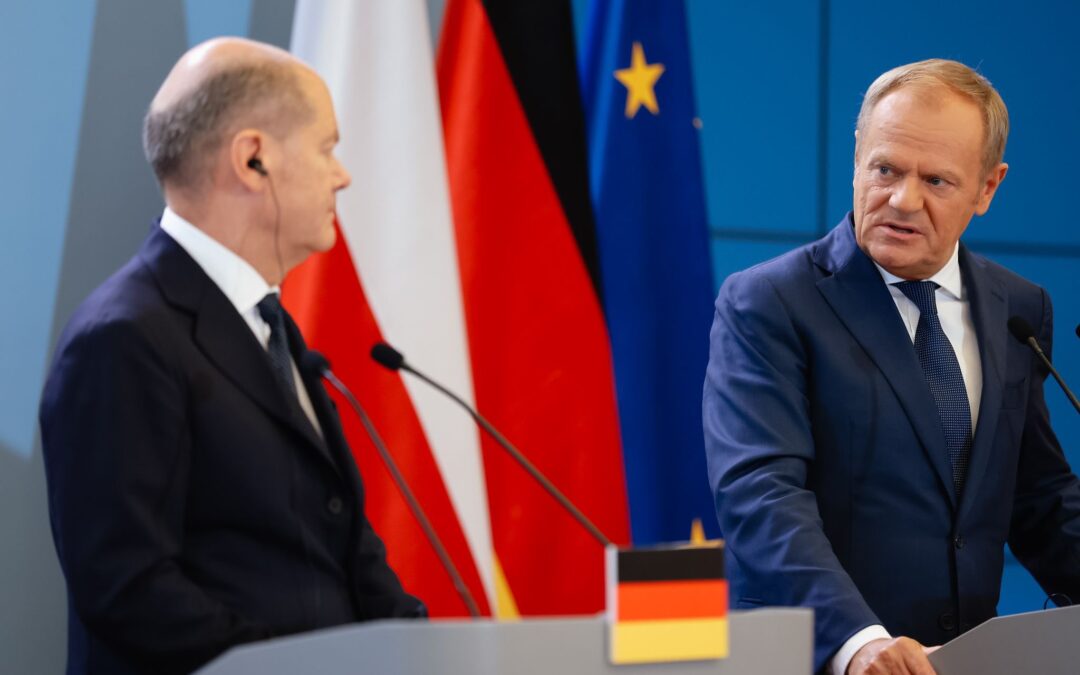German Chancellor Olaf Scholz has announced during a visit to Warsaw that his country will offer support to surviving Polish victims of German-Nazi crimes and will help strengthen Poland’s eastern border. However, in both cases he did not provide details of what these measures would involve in practice.
Scholz was visiting Poland along with his cabinet for the first Polish-Germany intergovernmental consultations since 2018, when his predecessor Angela Merkel was in power and Poland was led by the Law and Justice (PiS) party.
PiS, which is now in opposition, has criticised Scholz’s offer of support for Polish war victims as “scraps” compared to the $1.3 trillion in reparations that Poland claimed from Germany in 2022 when PiS was in office.
📷 Premier @DonaldTusk przywitał @Bundeskanzler w Warszawie. Rozpoczynają się polsko-niemieckie konsultacje międzyrządowe. pic.twitter.com/MxUmMlOjOe
— Kancelaria Premiera (@PremierRP) July 2, 2024
“We, the Germans, caused Poland immense suffering during World War II,” said Scholz, speaking alongside Tusk after their meeting. “Germany is aware of its guilt and the tasks resulting from this…Germany will try to provide support to survivors of the occupation.”
Scholz, however, did not provide any details of what form that support would take, who would be eligible, or how much would be spent on it. Between 1992 and 2005, Germany already provided compensation to Polish victims of German-Nazi crimes through the Foundation for Polish-German Reconciliation.
According to the Polish Press Agency (PAP), around 40,000 Polish remaining survivors of the war could benefit from any additional German support.
When asked for more information by a journalist, Scholz said simply that “we are working on it with the Polish government; support for the elderly is very important to us and we will act in this area”.
Sorry to interrupt your reading. The article continues below.

Notes from Poland is run by a small editorial team and published by an independent, non-profit foundation that is funded through donations from our readers. We cannot do what we do without your support.
Tusk, meanwhile, said that he was “not disappointed with the gesture of the German government, because there is no amount of money that would compensate for what happened during World War Two”.
“If we hear today that Germany is ready to make a decision to compensate the living victims of the war…then these are steps in the right direction,” he added.
The Polish prime minister also welcomed the fact that the German government last week gave its approval to the creation of an institution in Berlin that will commemorate Polish victims of the war.
The German government has approved the establishment in Berlin of an institution commemorating Polish victims of Nazi Germany.
It says that the enormous suffering of Poles under German occupation "is still not well known" among Germans today https://t.co/gThmPLNWCh
— Notes from Poland 🇵🇱 (@notesfrompoland) June 27, 2024
During the two leaders’ remarks, Scholz also declared that Germany “wants to take on the role of a leader in NATO in protecting the eastern flank and the Baltic region”.
“The security of Germany and Poland are inextricably linked – Poland’s security is Germany’s security,” said the chancellor. He promised to boost “cooperation in the field of security and defence” as well as to continue providing support to Ukraine.
Tusk, meanwhile, declared that “no nations should feel as responsible for the security and protection of Europe from external aggression as the Polish and German nations”.
“Poland, as one of the greatest victims of World War Two, Germany as the perpetrators of the tragedy of World War II, today as free, democratic, European nations, should jointly and effectively ensure that Europe is safe, so that the tragedy of war is never repeated on our lands,” he added.
Premierminister 🇵🇱 @donaldtusk in Warschau:
"Unser Ziel war es, den deutsch-polnischen Beziehungen neuen Schwung zu verleihen. In diesen Zeiten sollte niemand daran zweifeln, dass die Zusammenarbeit zwischen den beiden Ländern extrem wichtig ist." https://t.co/jVVh41wqZ2
— Botschaft Polen DE (@PLinDeutschland) July 2, 2024
Ahead of Scholz’s visit – when media reports suggested that he would announce support for Polish victims of the war – PiS figures dismissed the offer as insufficient.
“We will not be satisfied with any scraps, any attempts to cover up this topic with some small amounts or small actions on the part of the German government,” said Jacek Sasin, who served as deputy prime minister in the PiS government, ahead of Scholz’s visit.
Stanisław Żaryn, who also served in the PiS government and is now an advisor to PiS-aligned President Andrzej Duda, likewise told news website wPolityce ahead of the visit that he “fears Olaf Scholz has indeed brought some scraps to Poland”.
This is intended to “allow him to save face and gain some protection from the Polish government when it comes to these issues of reparations, but it will certainly not be the form of compensation we should expect”, added Żaryn. “Today’s proposal can only arouse a smile of pity.”
"Germans have gaps in their memory" regarding WWII, says Poland's foreign minister. "They know about the Holocaust but have forgotten what they did to the Polish population."
He called on Berlin to compensate Poland for the "enormous losses" it suffered https://t.co/3D71btDBLg
— Notes from Poland 🇵🇱 (@notesfrompoland) February 12, 2024
Main image credit: Krystian Maj/KPRM (under CC BY-NC-ND 3.0 PL)

Daniel Tilles is editor-in-chief of Notes from Poland. He has written on Polish affairs for a wide range of publications, including Foreign Policy, POLITICO Europe, EUobserver and Dziennik Gazeta Prawna.



















